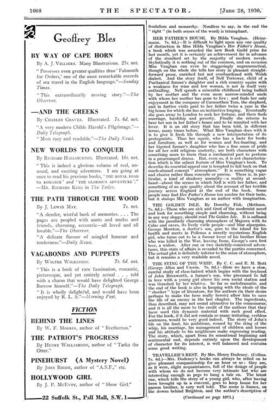THE STING OF THE WHIP. By C. C. and E.
M. Mott (George Allen and Unwin. Is. 6d.)—Here we have a slow, careful study of class-hatred which begins with the boyhood of John Broxworth, a farmer's son, who presumed to fall in love with a young girl above his own social station and was thrashed by her relative. 'So far so melodramatic, and the end of the book is also in keeping with the ideals of the " shocker " type of literature, for the authors (in their desire perhaps to make the hero really heroic) allow him to save the life of an enemy in the last chapter. The ingredients, thus described, may not sound attractive to the connoisseur; and it is all the -more to the credit of the authors that they have used this dynamic material with such good effect. For the book, if it did not contain so many irritating, verbless sentences, would be very good indeed. The story of John's life on the land, his ambitions, roused by the sting of the whip, his marriage, his management of children and horses and his attitude to his neighbours make engrossing reading. The story, which, apart from its sensational beginning and sentimental end, depends entirely upon the development of character for its interest, is well balanced and contains some good writing.


















































 Previous page
Previous page